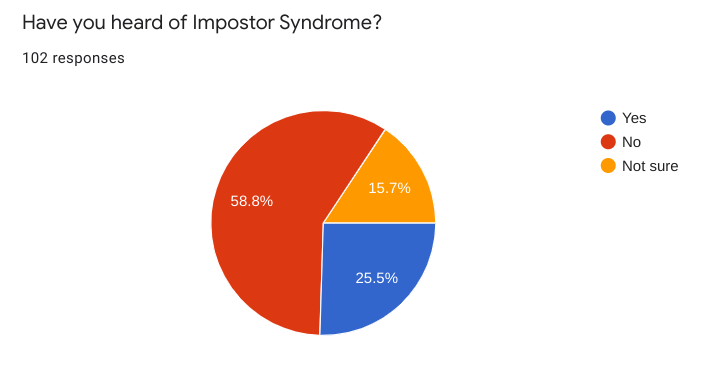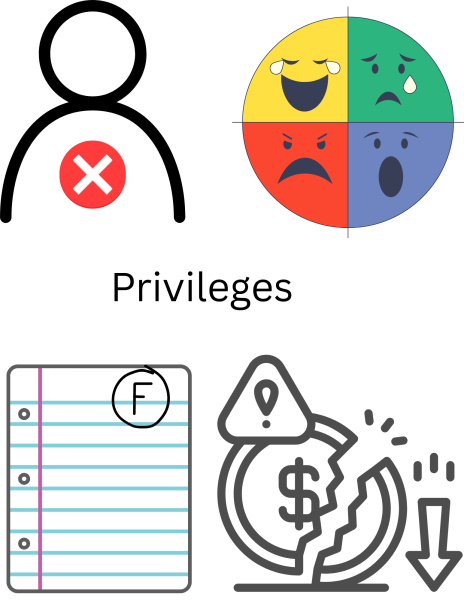Impostor Syndrome: thoughts of inadequacy eclipse individual worth
Shedding light on the unspoken phenomenon many experience, as well as the scare factor of diagnostic terms.
Chart from the anonymous survey conducted by Erika Schiesl on AGHS students, showing how well students know of Impostor Syndrome.
If you were to google “Impostor syndrome,” a myriad of cryptic titles would appear.
“We’re all frauds”
“Why it can kill careers”
“The truth about feeling like a fake”
“How to use your Impostor Syndrome as an asset”
“The dilemma between who we are and who we are perceived to be”
“Impostor feelings fuel negative mental health outcomes for minority students”
Buzzfeed alone has eight articles with “Impostor syndrome” in the title. This topic is growing in popularity. However, many people are still unaware of what it truly means.
According to an anonymous survey of Arroyo Grande High School students, 58.8% did not know what Impostor Syndrome is before participating in the poll. Even if many people don’t know its definition, that doesn’t mean they haven’t experienced it or some of its trademark characteristics.
Licensed Clinical Psychologist Dr. Tammy Dobbs stated, “Impostor Syndrome is a cognitive distortion… it’s discounting your positives, minimizing your strengths, over-focusing on your negatives… the goal is to help people challenge the thinking that makes them feel bad, and expose themselves to praise. Talking about it helps, it’s a lot more common than people realize.”
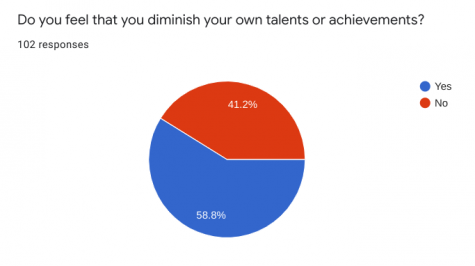
Many of the students surveyed defined what they believe Impostor Syndrome (I.S.) to be. Some were wild guesses, some were solid inferences, and others were fully correct. The following are some of the most accurate responses:
“The belief that you aren’t qualified to do the tasks you are responsible for.”
“Impostor syndrome means that you feel like others see you as out of place, less meaningful, and less competent than you are.”
“It means that you are less likely to believe you are as competent as others tell you that you are. You feel undeserving of your achievements and like you are an “imposter” in your own life…”
There were some students who didn’t appear to know about I.S. beforehand but were nearly faultless in their responses.
“I think that it refers to someone not feeling like they are worth as much as others perceive them to be. If people have this perfect image of you, you don’t really think that is who you are.”
“I think that Impostor Syndrome occurs when an individual feels as though they have done something wrong/inadequately/unfairly/etc. despite receiving praise from others or acknowledgement of achievement.”
The Merriam-Webster dictionary defines I.S. as “a psychological condition that is characterized by persistent doubt concerning one’s abilities or accomplishments accompanied by the fear of being exposed as a fraud despite evidence of one’s ongoing success.”
I.S. could be considered as a condition, experience, phenomenon, or even a complex, but is not recognized as a diagnosable disorder.
“I would classify it as one of the anxiety disorders because it is a preoccupation with a thought that is not helpful to you. It’s not a diagnosis, and it’s interesting because it isn’t in the DSM 5,” explained Dr. Dobbs.
Historically, the term “Impostor Syndrome” was first used with successful women of the 1970s. Despite the greater prevalence of women employed in positions of power in the seventies, decades of sexual discrimination cannot be so easily dismissed, and women struggled to feel like they deserved their achievements.
“Writing at the time, two clinical psychologists – Dr. Pauline Clance and Dr. Suzanne Imes – described interviews they’d conducted with 150 highly successful women who ‘despite their earned degrees, scholastic honours, high achievement…praise and professional recognition’ reported feeling no internal sense of success and considered themselves to be impostors,” according to The British Psychological Society.
However, this original application should be used to give perspective into how I.S. came into existence, not to convolute its current, more complete understanding past 70’s female high-achievers.
“And while yes, early research from the psychologists’ work focused on high-achieving women, the syndrome has actually been found to impact men and women in roughly equal numbers,” elaborates Psychology Today.
Men have been found to refrain from sharing their feelings of impostorism despite experiencing it just as frequently as women.
“‘Men who deviate from the strong-assertive stereotype — in other words, men who are able to express self-doubt — risk experiencing what psychologists call ‘stereotype backlash’: punishment, which often takes the form of harassment or even ostracism, for failing to conform to societal expectations.’ As a result, men end up hiding their fears, unable to unburden themselves and seek help,” explained Harvard Psychologist Amy Cuddy.
The survey of AGHS students showed that 56% of female respondents believe they have experienced I.S. at least sometimes, compared to only 35% of male respondents.
“Maybe women report more, but I think it goes across gender, race, and sexuality… it’s not like in the 70s, a thing that overachieving women had, that’s just the population that they decided to target in that study. It is a much broader topic across many different individuals,” said Dr. Dobbs.
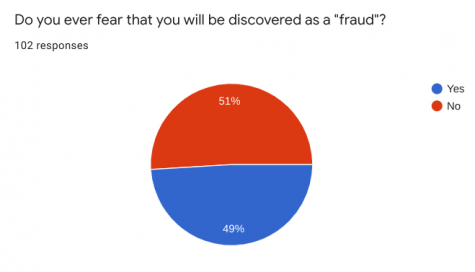
It is crucial to recognize the full reach I.S. has, and realize that people from all positions and backgrounds can feel like a fraud.
In fact, I.S. is common among highly successful individuals.
Emma Watson and Tom Hanks are just two of many esteemed celebrities who have acknowledged feelings of impostorism. In her Ted Talk specifically dedicated to I.S., Elizabeth Cox mentions another famous individual who experienced it before the term was coined.
“Albert Einstein experienced something similar: he described himself as an ‘involuntary swindler’ whose work didn’t deserve as much attention as it had received,” according to Triple J.
It may be surprising to learn that such a brilliant mind could doubt its capabilities; however, I.S. frequently affects individuals who are more than capable and nearly a quarter of the AGHS students surveyed reported feeling that luck is the only explanation for their achievements.
“One of my practicum students said she has it, and she’s always felt she shouldn’t be there and (that) she doesn’t deserve to be there, and she just got approved to do her… internship at UCLA. She deserves to be there!” exclaimed Dobbs.
Additionally, those belonging to minority groups, in terms of elements of identity such as race, religion, ethnicity, and sexual orientation, have been found to increase feelings of impostorism as a result of having their identity disrespected or otherwise feeling that they don’t deserve to be where they are due to society’s ostracism, historically or presently.
According to the anonymous survey of AGHS students, 55% of LGBTQ+ individuals reported experiencing I.S. compared to 45% of non-LGBTQ+ individuals.
Furthermore, upbringing impacts the way someone is molded in their early years. Growing up under certain circumstances can make it especially difficult for one to break out of that mold and take a form of their own, triggering feelings of self-doubt and invalidation.
“Abusive families, alcoholic parents, (and) parents with substance use disorders are often very critical with (their children), so it’s very common for people who struggle with mental health issues to be the children of those folks… A parent with borderline disorder has to be the victim, the person who gets all the attention, so the child is never good enough and (the child) feels they have to prove themselves constantly,” clarified Dr. Dobbs.
The human mind often contradicts itself. It allows for so much growth yet will sow seeds of doubt in intelligence. It is crucial to remember that a thought is not the truth until it is verified as such, and prevent worries from obstructing goals.
“(Feeling like a fraud) is not real, It’s just a thought (and) is not a fact,” Dr. Dobbs said. “It’s almost like a self-fulfilling prophecy,” she adds.
I.S. can feel all-encompassing and cause people to feel so inadequate and closed off from their peers, but it must be realized that these are mere worries and many others experience similar feelings.
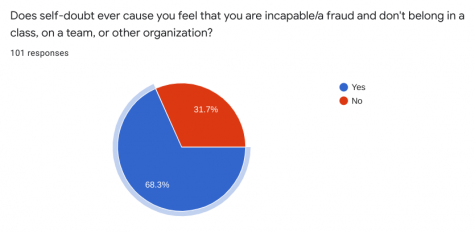
The threatening connotations of diagnostic terms don’t help. Syndrome, problem, disorder, diagnosis, and label are all words that instigate a flight response from many individuals because they imply that something requires “fixing.” Struggles are easier to cast aside when they are nameless, and admitting that there is an issue of some sort is often one of the most difficult parts of coping. Pride still exists in some of the most doubtful and anxious minds.
“I think the word ‘syndrome’ scares people. ‘Syndrome’ sounds like something is wrong with you,” began Dr. Dobbs. “Nobody wants a label.”
If people choose to look at the positive implications of those terms, the narrative shifts.
A label doesn’t condemn someone as sick or flawed, it identifies a small and common difference in the way your mind works and opens you up to a community of others who understand. A diagnosis is not a death sentence, it allows a professional to treat and help you as quickly and accurately as possible. A syndrome is defined as “a group of signs and symptoms that occur together and characterize a particular abnormality or condition,” while disorder simply means a ”lack of order,” according to Merriam Webster.
Breaking down the true definitions of these words and looking past the stigma allows people to see I.S. and other mental struggles for what they are, and take the first step to overcome them.
The survey of AGHS students showed that 64% of individuals dealing with mental health struggles reported experiencing I.S.
It is evident that people face similar struggles as one another, but often don’t share their experiences out of fear of a negative response from their peers. Nevertheless, it is through communication and relating with each other that these struggles become easier to navigate. The fear of being discovered as a fraud is not so well-reasoned when the world is largely made up of people who feel like they don’t belong.

For anyone coping with Impostor Syndrome individually, Dr. Dobbs offers this philosophy:
“Nevermind your mind. Sometimes your mind is not a reliable reporter.”
If you are interested in the rest of the data from the survey conducted on AGHS students, you can view the google form responses.

Erika Schiesl is a senior and is excited to be a part of the Eagle Times again this year. Aside from writing stories, she also enjoys photography, art,...


